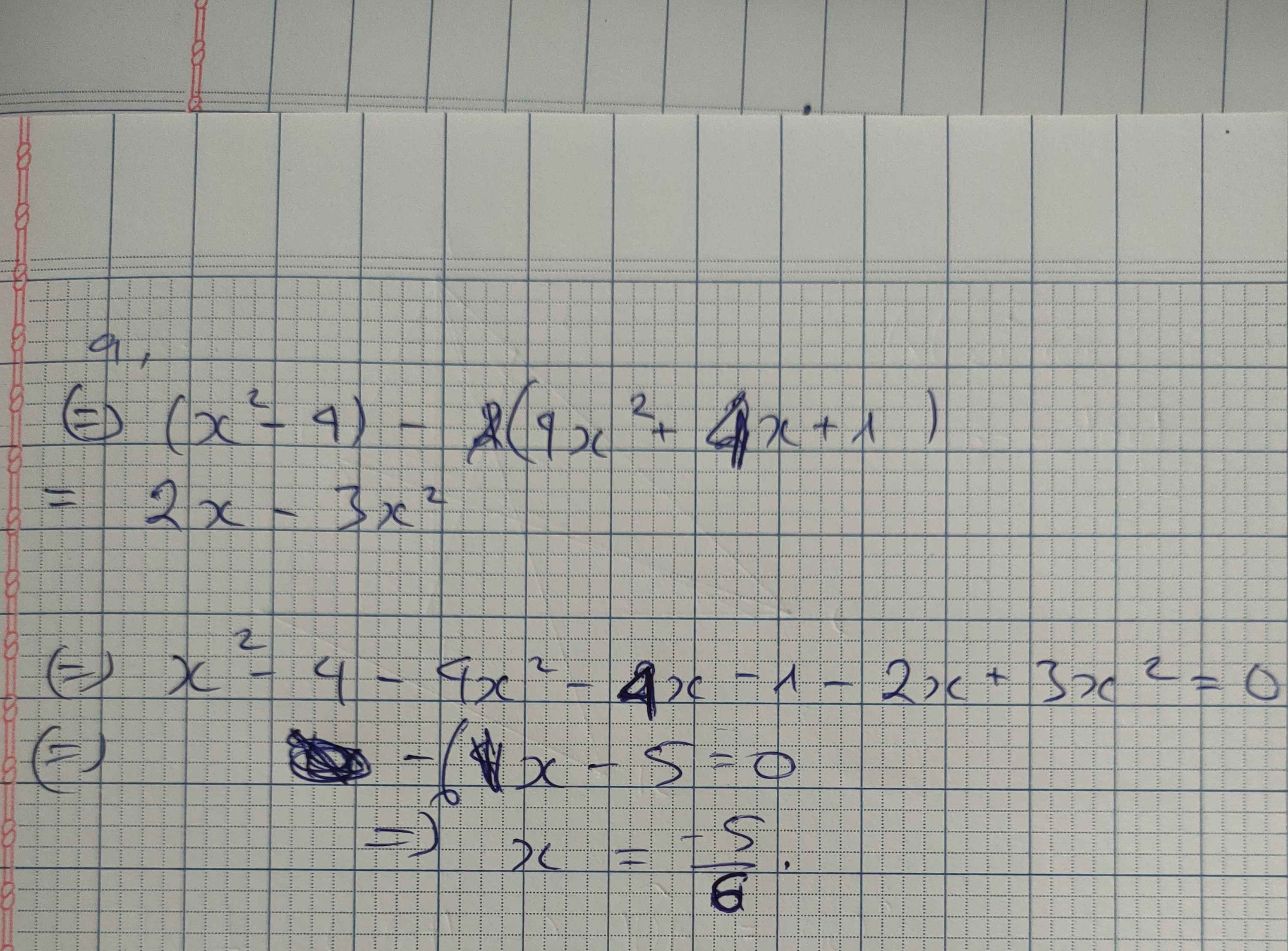
Hãy nhập câu hỏi của bạn vào đây, nếu là tài khoản VIP, bạn sẽ được ưu tiên trả lời.


1/ \(7x-5=13-5x\)
\(\Leftrightarrow12x=18\)
\(\Leftrightarrow x=\dfrac{3}{2}\)
Vậy: \(S=\left\{\dfrac{3}{2}\right\}\)
==========
2/ \(19+3x=5-18x\)
\(\Leftrightarrow21x=-14\)
\(\Leftrightarrow x=-\dfrac{2}{3}\)
Vậy: \(S=\left\{-\dfrac{2}{3}\right\}\)
==========
3/ \(x^2+2x-4=-12+3x+x^2\)
\(\Leftrightarrow-x=-8\)
\(\Leftrightarrow x=8\)
Vậy: \(S=\left\{8\right\}\)
===========
4/ \(-\left(x+5\right)=3\left(x-5\right)\)
\(\Leftrightarrow-x-5=3x-15\)
\(\Leftrightarrow-4x=-10\)
\(\Leftrightarrow x=\dfrac{5}{2}\)
Vậy: \(S=\left\{\dfrac{5}{2}\right\}\)
==========
5/ \(3\left(x+4\right)=\left(-x+4\right)\)
\(\Leftrightarrow3x+12=-x+4\)
\(\Leftrightarrow4x=-8\)
\(\Leftrightarrow x=-2\)
Vậy: \(S=\left\{-2\right\}\)
[----------]
1. \(7x-5=13-5x\) \(\Leftrightarrow12x=18\Leftrightarrow x=\dfrac{3}{2}\)
2. \(19+3x=5-18x\Leftrightarrow21x=-14\Leftrightarrow x=-\dfrac{2}{3}\)
3. \(x^2+2x-4=-12+3x+x^2\Leftrightarrow-x=-8\Leftrightarrow x=8\)
4. \(-\left(x+5\right)=3\left(x-5\right)\Leftrightarrow-x-5=3x-15\Leftrightarrow4x=10\Leftrightarrow x=\dfrac{5}{2}\)
5. \(3\left(x+4\right)=-x+4\Leftrightarrow3x+12=-x+4\Leftrightarrow4x=-8\Leftrightarrow x=-2\)

Bài 1:
\(a,=6x^2+6x\\ b,=15x^3-10x^2+5x\\ c,=6x^3+12x^2\\ d,=15x^4+20x^3-5x^2\\ e,=2x^2+3x-2x-3=2x^2+x-3\\ f,=3x^2-5x+6x-10=3x^2+x-10\)
Bài 2:
\(a,\Leftrightarrow3x^2+3x-3x^2=6\\ \Leftrightarrow3x=6\Leftrightarrow x=2\\ b,\Leftrightarrow6x^2+3x-6x^2+9x-2x-3=10\\ \Leftrightarrow10x=13\Leftrightarrow x=\dfrac{13}{10}\)

1) (2x + 1)(3x – 2) = (5x – 8)(2x + 1)
⇔ (2x + 1)(3x – 2) – (5x – 8)(2x + 1) = 0
⇔ (2x + 1).[(3x – 2) – (5x – 8)] = 0
⇔ (2x + 1).(3x – 2 – 5x + 8) = 0
⇔ (2x + 1)(6 – 2x) = 0
⇔\(\left[{}\begin{matrix}2x+1=0\\6-2x=0\end{matrix}\right.\) ⇔ \(\left[{}\begin{matrix}x=\dfrac{-1}{2}\\x=3\end{matrix}\right.\)
Vậy.....
2) 4x2 -1 = (2x + 1)(3x - 5)
⇔ (2x-1)(2x+1)-(2x+1)(3x-5)=0
⇔ (2x+1)(2x-1-3x+5)=0
⇔ (2x+1)(4-x)=0
⇔ \(\left[{}\begin{matrix}2x+1=0\\4-x=0\end{matrix}\right.\) ⇔ \(\left[{}\begin{matrix}x=\dfrac{-1}{2}\\x=4\end{matrix}\right.\)
Vậy...
3)
(x + 1)2 = 4(x2 – 2x + 1)
⇔ (x + 1)2 - 4(x2 – 2x + 1) = 0
⇔ x2 + 2x +1- 4x2 + 8x – 4 = 0
⇔ - 3x2 + 10x – 3 = 0
⇔ (- 3x2 + 9x) + (x – 3) = 0
⇔ -3x (x – 3)+ ( x- 3) = 0
⇔ ( x- 3) ( - 3x + 1) = 0
⇔\(\left[{}\begin{matrix}x-3=0\\-3x+1=0\end{matrix}\right.\) ⇔\(\left[{}\begin{matrix}x=3\\x=\dfrac{1}{3}\end{matrix}\right.\)
Vậy......

\(a,\Leftrightarrow x^2+6x+9-x^2+3x+10=1\\ \Leftrightarrow9x=-18\Leftrightarrow x=-2\\ b,\Leftrightarrow4x^2-4x+1-4x^2+17x+15=3\\ \Leftrightarrow13x=-13\Leftrightarrow x=-1\\ c,\Leftrightarrow3x\left(x-2\right)+4\left(x-2\right)=0\\ \Leftrightarrow\left(3x+4\right)\left(x-2\right)=0\\ \Leftrightarrow\left[{}\begin{matrix}x=-\dfrac{4}{3}\\x=2\end{matrix}\right.\\ d,\Leftrightarrow2x\left(3x+5\right)-6\left(3x+5\right)=0\\ \Leftrightarrow\left(x-3\right)\left(3x+5\right)=0\\ \Leftrightarrow\left[{}\begin{matrix}x=3\\x=-\dfrac{5}{3}\end{matrix}\right.\)

1: \(\dfrac{2x^3+11x^2+18x-3}{2x+3}\)
\(=\dfrac{2x^3+3x^2+8x^2+12x+6x+9-12}{2x+3}\)
\(=x^2+4x+3-\dfrac{12}{2x+3}\)

Bài 1:
1. \(x-8=3-2\left(x+4\right)\)
\(x-8=3-2x-8\)
\(3x=3\Rightarrow x=1\)
2. \(2\left(x+3\right)-3\left(x-1\right)=2\)
\(2x+6-3x+3=2\)
\(-x+9=2\Rightarrow x=7\)
3. \(4\left(x-5\right)-\left(3x-1\right)=x-19\)
\(4x-20-3x+1=x-19\)
\(0x=0\Rightarrow x=0\)
4. \(7-\left(x-2\right)=5\left(2x-3\right)\)
\(7-x+2=10x-15\)
\(-11x=-24\Rightarrow x=\frac{24}{11}\)
5. \(32-4\left(0,5y-5\right)=3y+2\)
\(32-2y+20=3y+2\)
\(-5y=-50\Rightarrow y=10\)
6. \(3\left(x-1\right)-x=2x-3\)
\(3x-3-x=2x-3\)
\(0x=0\Rightarrow x=0\)
Bài 2:
1. \(\frac{2-x}{3}=\frac{3-2x}{5}\)
\(\frac{\left(2-x\right)5}{15}-\frac{\left(3-2x\right)3}{15}=0\)
\(\frac{10-5x-9+6x}{15}=0\)
\(x+1=0\Rightarrow x=-1\)
2. \(\frac{3-4x}{4}=\frac{x+2}{5}\)
\(\frac{5\left(3-4x\right)}{20}-\frac{4\left(x+2\right)}{20}=0\)
\(\frac{15-20x-4x-8}{20}=0\)
\(7-24x=0\)
\(24x=7\Rightarrow x=\frac{7}{24}\)

a: \(\Leftrightarrow x^2-4-4x^2-4x-1-2x+3x^2=0\)
=>-6x-5=0
=>-6x=5
hay x=-5/6
b: \(\Leftrightarrow2x^3+8x^2+8x-8x^2-2x^3+16=0\)
=>8x+16=0
hay x=-2
c: \(\Leftrightarrow x^3-6x^2+12x-8+9x^2-1-x^3-3x^2-3x-1=0\)
=>9x-10=0
hay x=10/9
d: \(\Leftrightarrow10x-15-20x+28=19-2x^2-4x-2\)
\(\Leftrightarrow-10x+13+2x^2+4x-17=0\)
\(\Leftrightarrow2x^2-6x-4=0\)
\(\Leftrightarrow x^2-3x-2=0\)
\(\text{Δ}=\left(-3\right)^2-4\cdot1\cdot\left(-2\right)=9+8=17>0\)
Do đó: Phương trình có hai nghiệm phân biệt là:
\(\left\{{}\begin{matrix}x_1=\dfrac{3-\sqrt{17}}{2}\\x_2=\dfrac{3+\sqrt{17}}{2}\end{matrix}\right.\)



Bạn ơi bạn học lớp 8 rồi bạn có thể giải giú mình 2 bài toán lớp 7 đang đăng ko. Nếu đc minh cảm ơn nhiều nhé